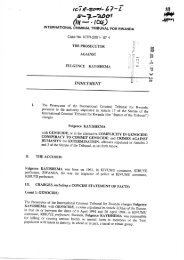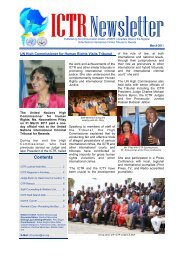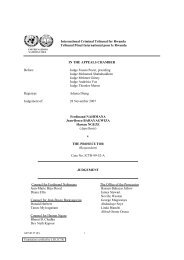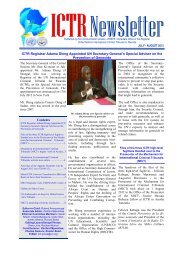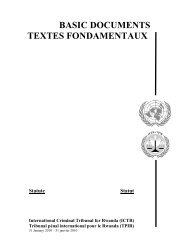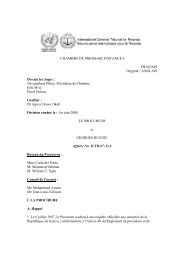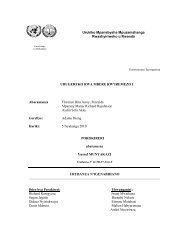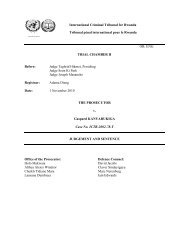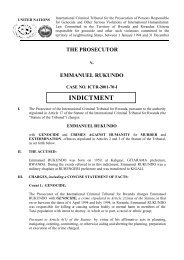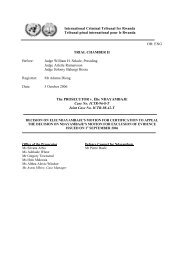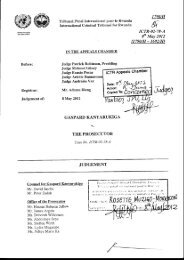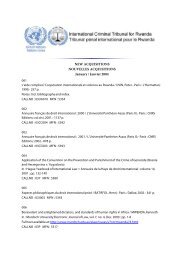Report of Proceedings - International Criminal Tribunal for Rwanda
Report of Proceedings - International Criminal Tribunal for Rwanda
Report of Proceedings - International Criminal Tribunal for Rwanda
Create successful ePaper yourself
Turn your PDF publications into a flip-book with our unique Google optimized e-Paper software.
ing out evidence that supported a charge <strong>of</strong> crimes <strong>of</strong> sexual violence in the original<br />
indictment. Investigators have also at times lacked awareness <strong>of</strong> the importance <strong>of</strong><br />
investigating these crimes and sensitivity in collecting evidence about them.<br />
Judge Pillay pointed out that jurisprudence from the ad-hoc tribunals has influenced the<br />
definitions <strong>of</strong> rape and other sexual crimes and consequently the nature <strong>of</strong> evidence that has to<br />
be collected to prosecute these crimes. She concluded by asserting that rape and other sexual<br />
crimes are as serious as other types <strong>of</strong> international crime. As suc h, they ought to be accorded<br />
the same attention.<br />
“We Can do Better: Investigating and Prosecuting <strong>International</strong> Crimes <strong>of</strong> Sexual<br />
Violence,” presented by Ms. Binaifer Nowrojee<br />
The central issue raised in Ms. Nowrojee’s presentation was that the prosecutio n <strong>of</strong> crimes<br />
<strong>of</strong> sexual violence has not been as consistent or thorough as it could be in international<br />
criminal courts. Ms. Nowrojee identified the following measures that could be taken to address<br />
the problem:<br />
• Creating political will on the part <strong>of</strong> the prosecutor;<br />
• Designing a prosecution strategy <strong>for</strong> rape at the outset <strong>of</strong> the court’s activities;<br />
• Training all staff so that they understand the complex issues surrounding<br />
sexual crimes and their investigation;<br />
• Dedicating a staff specialised in the investigation <strong>of</strong> sexual crimes;<br />
• Care <strong>for</strong> the wellbeing, safety, and dignity <strong>of</strong> rape victims. This requires that<br />
sufficient in<strong>for</strong>mation be provided to victims, that they have the agency to<br />
decide how they want to proceed vis-à-vis the judicial process, that they are<br />
properly prepared to testify, and that they receive appropriate support and<br />
protection services;<br />
• Creating an enabling courtroom environment <strong>for</strong> victims <strong>of</strong> sexual crimes.<br />
Ms. Nowrojee concluded her presentation by pointing out that the evidence necessary to<br />
prosecute perpetrators <strong>of</strong> crimes <strong>of</strong> sexual violence exists. But prosecutors need to ask<br />
themselves how they can improve their methods <strong>of</strong> obtaining it.<br />
COMMENTS BY PANELISTS<br />
Mr. Gavin Ruxton, Chief <strong>of</strong> Prosecution, ICTY, observed that there are differences<br />
between the nature <strong>of</strong> investigations immediately following the creation <strong>of</strong> the ICTY and those<br />
taking place as it approaches the end <strong>of</strong> its mandate. Investigations now support the work <strong>of</strong><br />
prosecutors instead <strong>of</strong> leading to indictments. He reiterated some <strong>of</strong> the challenges laid out by<br />
Mr. Muna in the ICTR, including the lack <strong>of</strong> co-operation <strong>of</strong> States in investigations. Another<br />
challenge facing investigators is lack <strong>of</strong> familiarity with the context and facts. Evidence<br />
collected long after the events investigated is also a serious problem.<br />
9




